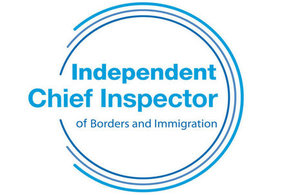An inspection of the Tier 4 curtailment process, July to September 2015
The Chief Inspector has published his short notice inspection of the Tier 4 curtailment process, July to September 2015.

ICIBI logo
Individuals who wish to come to the UK for study purposes and require a visa apply to the Home Office under Tier 4 of the Points-based System (PBS). To qualify for a student visa, the individual must produce a Confirmation of Acceptance of Studies (CAS) form from an educational establishment licensed by the Home Office to act as a sponsor.
Under the terms of their licence, Tier 4 sponsors must notify the Home Office of any changes in a student’s circumstances that would affect their sponsorship, for example, failure to enrol on their course, a pattern of unauthorised absences, withdrawal or expulsion, or early completion of their studies. Once notified, the Home Office considers the case and decides whether to curtail the student’s leave to remain in the UK (or cancel their leave to enter).
In 2014 to 2015, the Home Office issued over 60,000 Tier 4 visas, a reduction of roughly 25,000 from the previous year, which the Home Office attributed to the tightening up (from October 2014) of the Tier 4 visa entry route to make it less prone to abuse. In each of the last 2 years (2013 to 2014 and 2014 to 2015) it received 86,000 notifications from Tier 4 sponsors, and over the 2 years it curtailed the leave previously granted to almost 44,000 students.
This inspection considered the efficiency and effectiveness of the Home Office’s management of the Tier 4 curtailment process, examining how it handled notifications from sponsors, the checking of these cases, decision-making and subsequent actions. It found that the creation of a dedicated curtailment team had resulted in significant progress in reducing the large volume of outstanding notifications that had built up by 2012, and that the Home Office was largely on top of new notifications. Security checks were carried out consistently and thoroughly, and a decision quality framework had been introduced (in October 2014) that set clear expectations of caseworkers and monitored and measured performance.
However, the inspection also identified a number of areas for improvement. These included providing direct feedback to sponsors to clarify their reporting obligations and reduce the high levels of unnecessary notifications, and the time taken to progress notifications to the point where a consideration of curtailment was made.
Of most concern were ‘curtailment not pursued’ (CNP) cases, which included those who had a period of leave remaining that was shorter than the time they would be permitted to ‘wrap up’ their stay and depart, plus those who had already overstayed.
There was no process in place to monitor CNP cases to ensure that individuals with no right to remain in the UK had in fact departed voluntarily or, where necessary, had been identified for enforcement action. In the 2 years to April 2015, the Home Office made 71,601 CNP decisions. Many of these individuals might have departed the UK, or might have been granted leave to remain on other grounds. However, the true position, including the number and whereabouts of those who have remained in the UK illegally was not known.
The report makes 9 recommendations:
- Find a workable solution to providing Tier 4 licensed sponsors with direct feedback on the quality of their SMS notifications, with a view to achieving a significant reduction in the number of unnecessary notifications submitted each year.
- Maintain a record of the quality assurance of the sifting process for SMS notifications in order to evidence its effectiveness in ensuring that cases are not being incorrectly sifted ‘out’ as not requiring consideration for curtailment or any other action.
- Ensure that the assurance regime for Tier 4 curtailment covers the correct application by caseworkers of all relevant Immigration Rules and Home Office guidance (including the UKVI Operating Mandate), and that it informs the training and individual feedback provided to caseworkers.
- Publish service standards for the curtailment consideration process that: * take account of the 10-day deadline imposed on licensed sponsors for the submission of SMS notifications; and * drive the efficient use of resources.
- Issue clear instructions to caseworkers in relation to the closing of cases, and the referral of cases to issuing Entry Clearance Officers for cancellation, based on Advance Passenger Information (API) indicating that a Tier 4 student has departed the UK, or the absence of an API record of an individual in possession of a Tier 4 visa having entered the UK, and ensure that instructions are followed consistently.
- Treat cases that attract a curtailment not pursued (CNP) decision because the individual is an overstayer, or has a period of leave remaining that is shorter than their permitted period of grace and curtailment would have no practical effect, in the same way as curtailed cases.
- Take the necessary steps to identify and locate those individuals amongst the 71,000 curtailment not pursued (CNP) cases decided between 1 April 2013 and 31 March 2015 who have remained in the UK illegally, with a view to effecting their removal.
- Review the flow of cases referred to Capita to eliminate cases bouncing back as unworkable, including those that should have been closed based on Advance Passenger Information (API) and those curtailed cases where the period of grace has not expired when referred.
- Review whether the priority currently given to Tier 4 curtailed cases within the Immigration Enforcement national prioritisation matrix is appropriate.
The report was sent to the Home Secretary on 8 January 2016.
Full report: a short notice inspection of the Tier 4 curtailment process July to September 2015
The Home Office response to the Chief Inspector’s report on Tier 4 curtailment